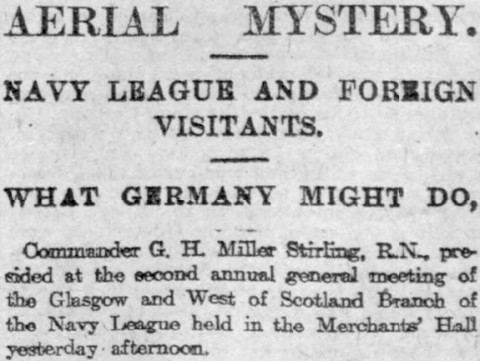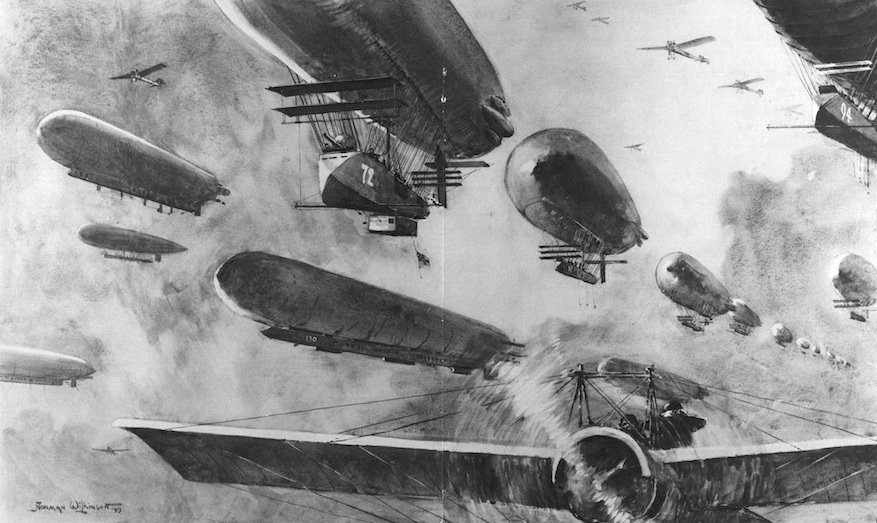
No phantom airships have been seen in the skies over Britain for the better part of a week, but it appears that one may have crashed in, of all places, Germany. The Derby Daily Telegraph carries the following story from Reuter’s in Berlin (p. 3):
Eighty chasseurs of the Guards are searching for the remains of a mysterious airship which, according to peasant women’s story, caught fire, exploded, and fell near Potsdam. The women, who are positive they saw the disaster, reported to the authorities, who telephoned for help. The commandant of Potsdam, with an ambulance column, doctors, fire brigades, and chasseurs searched in vain for the supposed wreck. All known airships are account for.
The date for this event is not given, but it must have been very recent since the Derby Daily Telegraph‘s report is dated today, and an abbreviated version appears in the Dundee Evening Telegraph in the stop press section (p. 1).
There was some discussion of the mystery airship danger at the second annual general meeting of the Navy League’s Glasgow and West of Scotland branch yesterday. As reported by the Aberdeen Daily Journal, the branch chairman, Commander G. H. Miller Stirling, RN, successfully moved the adoption of the branch’s annual report (since June 1910, when the branch was founded, 1570 people have joined, 1000 in 1912 alone) and then discussed ‘The rapid development of aerial craft on the Continent […] and our progress in this department, which was slow’ (p. 5; above). Stirling argued that
There had been a good many reports regarding airships being seen over the eastern counties of England, and it seemed time that should such a visitor appear we should be in a position to send up an aerial scout to demand what his business was, to ascertain his identity. The presence of a foreign airship passing over our fortified places, whether to observe, photograph, or sketch them, without any hindrance, appeared to him to demand serious consideration and instant repression.
Later, P. D. Ridge-Beedle moved that the government be urged to adopt ‘adequate measures for aerial defence’. He justified this demand by referring to the phantom airship visits:
Whether the reports in the press of airship visits to this country were true or not, the British Government knew or believed that during the course of last winter a German airship or German airships did pass over this country. And if they would not grant him that, he would say that the British Government knew that it was possible for such airships to pass over this country. That was proved by the regulations, an elaborate code of which was published within the last few days. (Hear, hear.)
Noting the size and power of Germany’s Zeppelins, Ridge-Beedle claimed that in wartime it would be possible for them ‘calmly and deliberately to poise over our battleships […] possibly sending them to the bottom’. As for the ‘three small airships’ possessed by Britain, these ‘were as popguns to a revolver’. Ridge-Beedle’s motion was seconded by R. M. Neilson and adopted.
Presumably Stirling, Ridge-Beedle and the other Glaswegian Navy Leaguers don’t think of much of the aerial navigation regulations, in common with other critics of the government’s aerial defence policy, on the basis that there is no real way to enforce them. But W. E. de B. Whittaker, writing in the Aeroplane, says that this is an over-literal view. The real value of the Aerial Navigation Act and the regulations made under it is that they will provide Britain with a casus belli in the case of a hostile overflight (pp. 306, 308):
Until this week the visit of a foreign airship or aeroplane, military or civil, could not be prevented. To-day, should a German dirigible float over Sheerness, the circumstance could be taken as an act of war, and the usual steps could be taken to avenge it.
This is unlikely to convince the indefatigable Manchester Courier, which continues its ‘”SHIPS THAT PASS IN THE NIGHT”‘ campaign with another long article from its German correspondent on the present and future Zeppelin threat, which it commends ‘To those who imagine an airship to be a scareship’ (p. 7).
![]() This work is licensed under a Creative Commons Attribution-NonCommercial-NoDerivatives 4.0 International License.
Permissions beyond the scope of this license may be available at http://airminded.org/copyright/.
This work is licensed under a Creative Commons Attribution-NonCommercial-NoDerivatives 4.0 International License.
Permissions beyond the scope of this license may be available at http://airminded.org/copyright/.






Pingback: Friday, 14 March 1913
Pingback: Saturday, 15 March 1913
Pingback: Tuesday, 18 March 1913